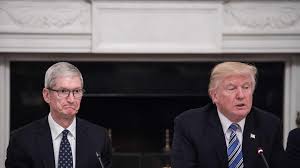Apple Shares plummets by 3% Amid Trump’s China Tariffs
Apple shares plummeted over 3% on Monday following President Donald Trump’s announcement of a 10% tariff on Chinese goods. Apple, which heavily relies on China for assembling its products, experienced a sharper decline than most tech giants, except Tesla.
This drop highlights the iPhone maker’s vulnerability to increased import costs.
During the first Trump administration, Apple managed to evade most tariffs by obtaining product-specific waivers and diversifying its assembly to countries like Vietnam, Malaysia, and India.
Despite these efforts, Apple remains heavily dependent on Chinese manufacturing.
The new tariffs, effective Tuesday, have prompted concerns about potential price hikes for consumers.
“Apple being included in China tariffs is contrary to our expectations,” wrote Rosenblatt analyst Barton Crockett in a note on Monday.
According to Crockett, he believes Apple will raise prices for customers, which could annoy Trump.
“We thought history would repeat. But that’s not the case right now,” Rosenblatt wrote.
Apple reported a 4% revenue growth in the December quarter, reaching $124 billion. However, the company anticipates only “low to mid-single-digit” growth for the current quarter, with a reported 11% decline in sales across China, Taiwan, and Hong Kong.
The ultimate impact of the tariffs on Apple’s profits may hinge on how much U.S. demand can be met from non-Chinese production sites.
Bank of America Securities analyst Wamsi Mohan estimated that sourcing 80% of U.S.-bound devices outside China, without price increases, could reduce annual earnings by less than 1%.
Conversely, if half of the devices are sourced from China, the earnings could be impacted by 12 cents per share.
As tariffs take effect, Mohan suggests Apple might ramp up production in India and other countries like Vietnam and Malaysia to mitigate the impact.
Analysts predict Apple’s fiscal year earnings, ending in September, to be $7.34 per share, according to LSEG.
Apple declined to comment on the tariffs.
CNBC


Comments are closed.